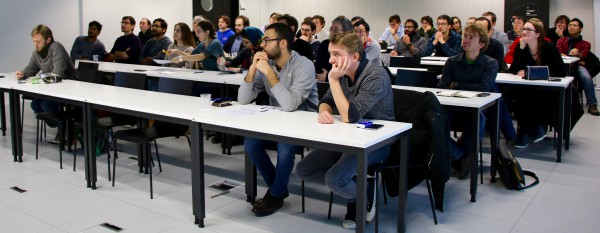MARVEL Junior Seminar — February 2020
The MARVEL Junior Seminars aim to intensify interactions between the MARVEL Junior scientists belonging to different research groups located at EPFL. The EPFL community interested in MARVEL research topics is very welcome to attend. We believe that these events will be central for establishing a vibrant community.
Each seminar consists of two presentations of 25 minutes each, allowing to present on a scientific question in depth, followed by time for discussion. The discussion is facilitated and timed by the chair.
Pizza is served at 11:45 in the MED hall (floor 0), and after the seminar at 13:30 you are cordially invited for coffee and dessert to continue discussion with the speakers.

MARVEL Junior Seminar Organizing Committee — Giuliana Materzanini, Stefano Falletta, Olga Syzgantseva, Maria Fumanal, Markus Stricker, Kristians Cernevics, Max Veit and Patrick Mayor
Talk 1 — Towards Building New Zeolites with Machine Learning
Benjamin A. Helfrecht1, Rocio Semino1,2, Giovanni Pireddu1,3, Scott M. Auerbach4, Michele Ceriotti1
1Laboratory of Computational Science and Modeling (COSMO), EPFL
2 Institut Charles Gerhardt Montpellier, Université de Montpellier
3 Dipartimento di Chimica e Farmacia, Università degli Studi di Sassari
4 Department of Chemistry and Chemical Engineering, University of Massachusetts Amherst
Synthesizing new zeolites, which are useful for applications like gas separation and catalysis, with specific properties is an ongoing challenge in the zeolite community. Ideally, one would like to select a handful of compatible “building blocks” from which a new zeolite with desired properties can be synthesized. In this work, we make progress toward this goal by constructing an “atlas” of local atomic environments [1] comprising several thousand all-silica zeolites from the Deem SLC PCOD database [2] using a combination of the Smooth Overlap of Atomic Positions (SOAP) representation [3], Kernel Ridge Regression (KRR) [4], and Kernel Principal Component Analysis (KPCA) [5]. We evaluate the utility of this atlas by examining correlations between the locations of the atomic environments in the atlas and their energy and volume contributions to their parent frameworks.
[1] B. A. Helfrecht, R. Semino, G. Pireddu, S. M. Auerbach, M. Ceriotti, J. Chem. Phys. 151,154112 (2019)
[2] R. Pophale, P. A. Cheeseman, M. W. Deem, Phys. Chem. Chem. Phys 13, 12407-12412(2011)
[3] A. P. Bartók, R. Kondor, G. Csányi, Phys. Rev. B. 87, 184115 (2013)
[4] A. J. Smola, B. Schölkopf, ICML ‘00 Proc. 17th Intl. Conf. On Machine Learning, 911-918(2000)
[5] B. Schölkopf, A. Smola, K.-R. Müller, Neural Computation 10, 1299-1319 (1998)
Talk 2 — Elementary kinetics of N2 reduction on RuO2 electrode
Yawei Li
Chair of Atomic Scale Simulation (CSEA), EPFL
In this work, reaction kinetics of aqueous N2 reduction on RuO2 electrodes were investigated using density functional theory combined with Butler-Volmer theory with the inclusion of explicit H2O solvent molecules. The utilization of DFT was compared to that of HSE06 hybrid functional. Ab initio thermodynamics was utilized to find the stable surface configuration of RuO2(110) surface in reducing environment. The reaction kinetics calculations indicate that the most difficult step (with the lowest limiting potential) is N2 reduction to either NNH* or NHN* intermediates with a kinetic barrier of >1V vs. RHE. The comparison with thermodynamics with implicit solvent model indicates that the estimation of overpotential by vibration barrier calculation is much larger than that by thermodynamic calculation (Norskov scheme). Additionally, the kinetic barrier of rate-limiting steps on pure and doped RuO2 shows a linear relationship with respect to the thermodynamic reaction energy.
Check the list of the next MARVEL Junior Seminars here.
Low-volume newsletters, targeted to the scientific and industrial communities.
Subscribe to our newsletter